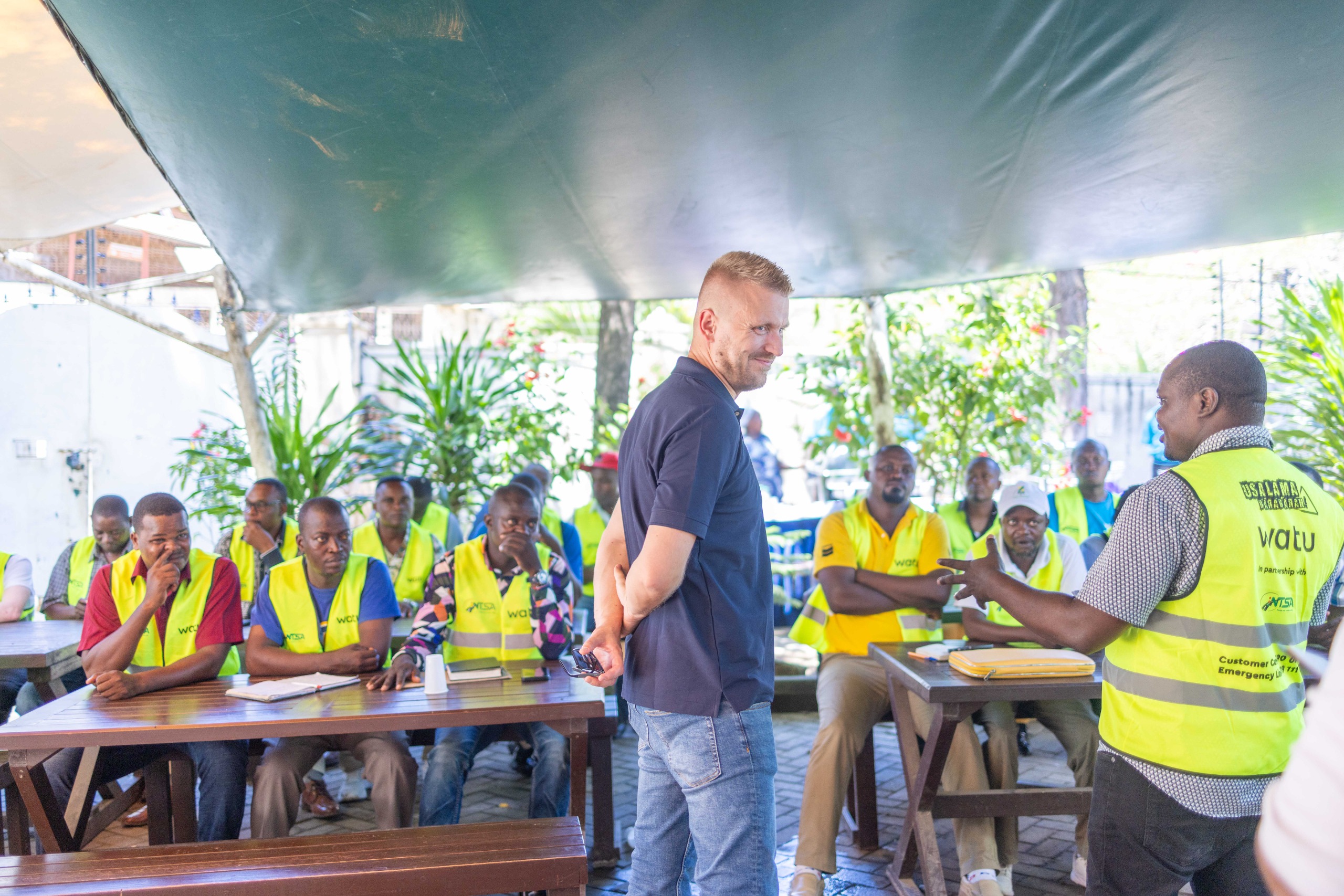In 2015, Watu Credit co-founder Andris Kaneps physically transferred a small cash loan to a women’s group in Kenya’s coastal city of Mombasa, a transaction so modest it belied the ambition of the venture. A decade later, the buy-now-pay-later (BNPL) startup has taken a transcontinental leap into Latin America, utilising what it claims is a profitability-tested model to tap into what its management views as a mirror of Africa’s vast, unbanked population.
The company’s expansion into Brazil—its second Latin American market after Mexico—is part of an aggressive growth plan targeting $340 million in revenue for 2025. This goal follows a year of explosive growth in 2024, where revenue surged 67% to $230 million. However, net profit plunged 85% as the company opted to fund its global expansion from its own balance sheet rather than seek venture capital.
“We always joke that if you can do business in Africa, you can do it anywhere,” said Andris Kaneps, Watu’s CEO and co-founder, in a joint interview with deputy CEO Paras Patel.
“Africa is not an easy place to do business—from regulations to logistics, to just the daily realities. So when we go to Latin America, we carry all that experience with us. It has made our skin thicker.”
Profit for scale
The duo believes that the philosophy of growth grounded in profitability has shaped nearly every major decision at Watu Credit over the past decade. As many African fintechs pursued rapid expansion fueled by venture capital, Watu took a different path, reinvesting its own earnings to fund its growth across eight African markets.
The company’s leaders argue this discipline has allowed Watu to weather funding slowdowns and currency volatility while still scaling aggressively.
“You’ve seen a lot of companies that were dependent on venture capital. As soon as that tap turned off, they collapsed,” Patel said. “Being profitable from day one ensures sustainability. Scalability ensures reach.”
That balancing act—between growth and profit—has defined Watu’s approach. Some years, Patel said, growth takes precedence; while in others, the focus shifts to margins. “This year, profit is a priority,” he added, hinting at a more disciplined phase after years of rapid expansion.
Nevertheless, the company’s profit focus hasn’t slowed its appetite for new markets or products. If anything, it has driven innovation, especially the pivot into smartphone financing, branded as Watu Simu, which now sits at the centre of its growth strategy.
The pivot
Watu’s innovation journey has largely been forced by the economic realities of its core markets. The company, which now operates in eight African countries and employs 3,000 people, built its brand on financing motorcycle taxis, popularly known as “boda-bodas.”
However, the economic shockwaves from the Russian invasion of Ukraine in 2022, which triggered a sharp depreciation of the Kenyan shilling and soaring fuel prices, highlighted the risks associated with a single product focus.
“We experienced turbulent times in 2022-23,” Kaneps recalled. “We understood that to grow the business and be stable, we need to push on geographic expansion, but we also need to think about new products.”
The logical extension at the time was smartphone financing. The data justified the shift. While the boda-boda market in Kenya addresses an estimated 1 million people, the potential smartphone market extends to 30-40 million economically active individuals.
“The idea came from our customers,” Patel said. “Uber drivers, app-based riders—they asked us to bring phones. We tested it, and it worked.”
Furthermore, with smartphone penetration in key markets such as Tanzania, Uganda, and the DRC lagging at around 20-30%, the addressable market is substantial compared to the saturated mobile money sector.
“The gap is so big. We are not worried about saturation,” Kaneps said. “We’re not worried about saturation because there’s so much more which needs to be done to close this gap.”
The LATAM calculus
The confidence in Latin America is based on data-driven belief in analogous market conditions. The company views the 650 million population of Latin America as comparable to Africa’s 1.4 billion people, with similar proportions lacking access to formal credit. Crucially, the commercial ecosystems outside major cities are similarly informal, requiring the kind of ground-up, relationship-based lending Watu has built.
“If you manage to do it in Africa, you can do it anywhere,” Kaneps said, a sentiment Patel echoed. “Africa is not an easy place to do business… Going into Latam, yes, many people actually do it. But that experience of 10 years has taught us so much.”
Their competitive edge, they argue, is not just technology but a deeply embedded network. The Simu product alone is supported by over 10,000 commission-based agents, a distribution channel that would take competitors years to build and cultivate. This creates great lessons as they seek new markets.
But the differences between the two markets are just as real. Credit bureaus in LATAM are more mature. Competition is stronger. Consumer protection laws are stricter. To succeed, Watu must adapt its model — local partnerships, compliance-heavy onboarding, and currency hedging to manage volatility.
Still, the opportunity is immense. In Latin America, more than 120 million adults remain unbanked, according to the World Bank. Informal self-employment rates exceed 50% in countries like Colombia and Peru.
Managing the risks
In a sector often criticised for over-indebting low-income earners, Watu distances itself from the classic BNPL model. Instead, it emphasises flexibility built around client income volatility.
For boda-boda loans, while the company did not disclose a specific non-performing loan (NPL) ratio, Kaneps acknowledged that the “absolute majority” of clients delay payments at some point. The response is not immediate aggression, but rather accommodation, similar to a free “lot storage” system where a rider can park their bike during a hardship period without accruing interest.
The smartphone product is structurally different and less risky. It operates on a pay-as-you-go model, locking the device if daily payments are missed. This has resulted in a significant portion of clients stretching their repayment period.
“Many people, instead of paying out the loan in one year, pay out in two years or even longer. And we don’t charge any penalty for that,” Kaneps said, noting the cost of this flexibility is priced into the product upfront.
Watu’s leadership believes its model of financing productive assets offers a universal path to unlocking economic potential for millions of its consumers. According to the company’s sustainability report, it has created 3,000 direct jobs, with a network of dealers and more than 10,000 agents who onboard customers, as well as millions of end-users at the outer ring.
A changing landscape
As Watu charts its next phase of growth, the landscape around it is undergoing a shift. Banks that once dismissed lending to the informal sector are now moving in, encouraged by the company’s success in proving that asset finance can scale sustainably. New fintech entrants are also emerging, backed by fresh capital and sophisticated technology.
For Watu’s top brass, the real advantage lies elsewhere.
“Banks are our partners, not our competitors,” said Patel. “Many of the same banks that doubted us at the beginning now provide the debt that fuels our lending. And when it comes to other fintechs—we’ve built this ecosystem from the ground up. It’s taken ten years. The true barrier to entry is the loyalty our dealers and agents have with Watu.”
The company is more guarded about its next move beyond LATAM. Asked what products might follow boda bodas and smartphones, both executives declined to give details.
“We don’t know yet, but we’re constantly listening to our customers,” said Kaneps. “We have many ideas we’re not ready to share.” Patel added, “It’s a bottom-up process. We start with the customer—what they need, what will make their lives better.”
That philosophy will guide Watu through what may be its most complex stage yet: managing rapid expansion across three continents, sustaining profitability in a capital-intensive business, and fending off competitors.
For Kaneps, who began the journey a decade ago in a modest Mombasa office, the company’s rise has been a vindication.
“My biggest happiness in the business is meeting our clients and hearing their stories,” he said. “Money is nice, profit is nice—but how much do you really need? It’s more about what you create.”
The coming years will test whether that creation can travel as far as Watu’s ambitions.
Mark your calendars! Moonshot by is back in Lagos on October 15–16! Meet and learn from Africa’s top founders, creatives & tech leaders for 2 days of keynotes, mixers & future-forward ideas. Get your tickets now: moonshot..com










